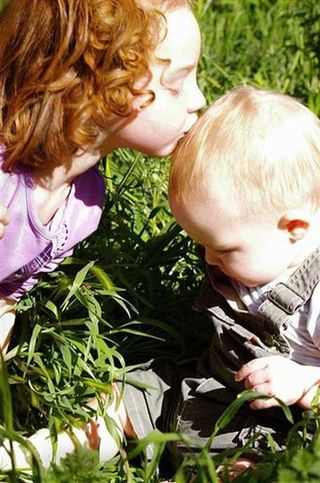
Choosing love seems to mean swallowing your kid's crap." - Philippe
I have two parenting mantras, which have become life mantras.
The first is "It is not an emergency." This always helps me calm
down so I can pay attention to what's actually happening, instead of getting hijacked by my alarm system. It allows me to make better choices. It worked so well when my kids were growing up that now as young adults they continue to use it, to themselves and to me, when things get tense.

Source: iStock/Used with Permission
Choosing love doesn't mean that you don't set limits:
"No throwing sand.....Out of the sandbox." Only that you aspire to be supportive rather than punitive: "You wish you could play in the sandbox. It was too hard for you to stop throwing sand. We'll try again tomorrow."
But choosing love does mean that you accept the other person with compassion, even when they're falling apart or lashing out. That's why it's common for parents who begin choosing love to find themselves wondering if they're "taking crap" as Philippe said.
And yes, choosing love does mean that we choose to swallow hard and refrain from taking our anger or worry out on our child. But we're not actually swallowing our child's crap. Instead, we're noticing our own suffering, which is making us overreact to our child. Choosing love doesn't mean we "swallow" that pain, which would be harmful to us. But it does mean that we refuse to take it out on our child.
How do we know this is old baggage? Because children will always act childish; they don't have a fully developed prefrontal cortex. But we as adults only stoop to that level when we get triggered. The definition of getting triggered is that the prefrontal cortex stops bringing reason to the situation because the emotions seize control. In other words, we overreact with big emotions because of our old unconscious learning. And of course, the child did not install that trigger. It's been there inside us for a long time. In fact, our child is giving us an opportunity to notice and heal that trigger. If we don't, we will probably take that old baggage and dump it on our child.
What can we do instead of swallowing that suffering? Just notice it. Sit with it. Breathe into the sensations the emotion causes in your body, and don't let your mind get sucked into any storyline. Just breathe. Love yourself through it. This is the hardest thing in the world, sitting with our own pain. But when we don't deal with our own suffering, we inevitably take it out on others. And the miracle of this mindful approach is that it works, just by bringing more consciousness to that old pattern. Think of it as shining a light, and the shadows melt away. Little by little, that old baggage begins to loosen its hold on us and to disappear.
Messy? Yes. That's the way human emotions are. But the miracle is that when we allow them -- even while limiting behavior -- the emotions begin to heal and settle. Things become more peaceful. You find yourself living in a home with a lot less drama and a lot more love.
Because when we refuse to visit our own pain on our child, we aren't only choosing love for our child. We're also choosing love for ourselves. We're breaking the cycle. We're healing.
So next time you get triggered, stop, drop your agenda, and take a deep breath.
Then choose love.
See what kind of miracle you can make.

No comments:
Post a Comment